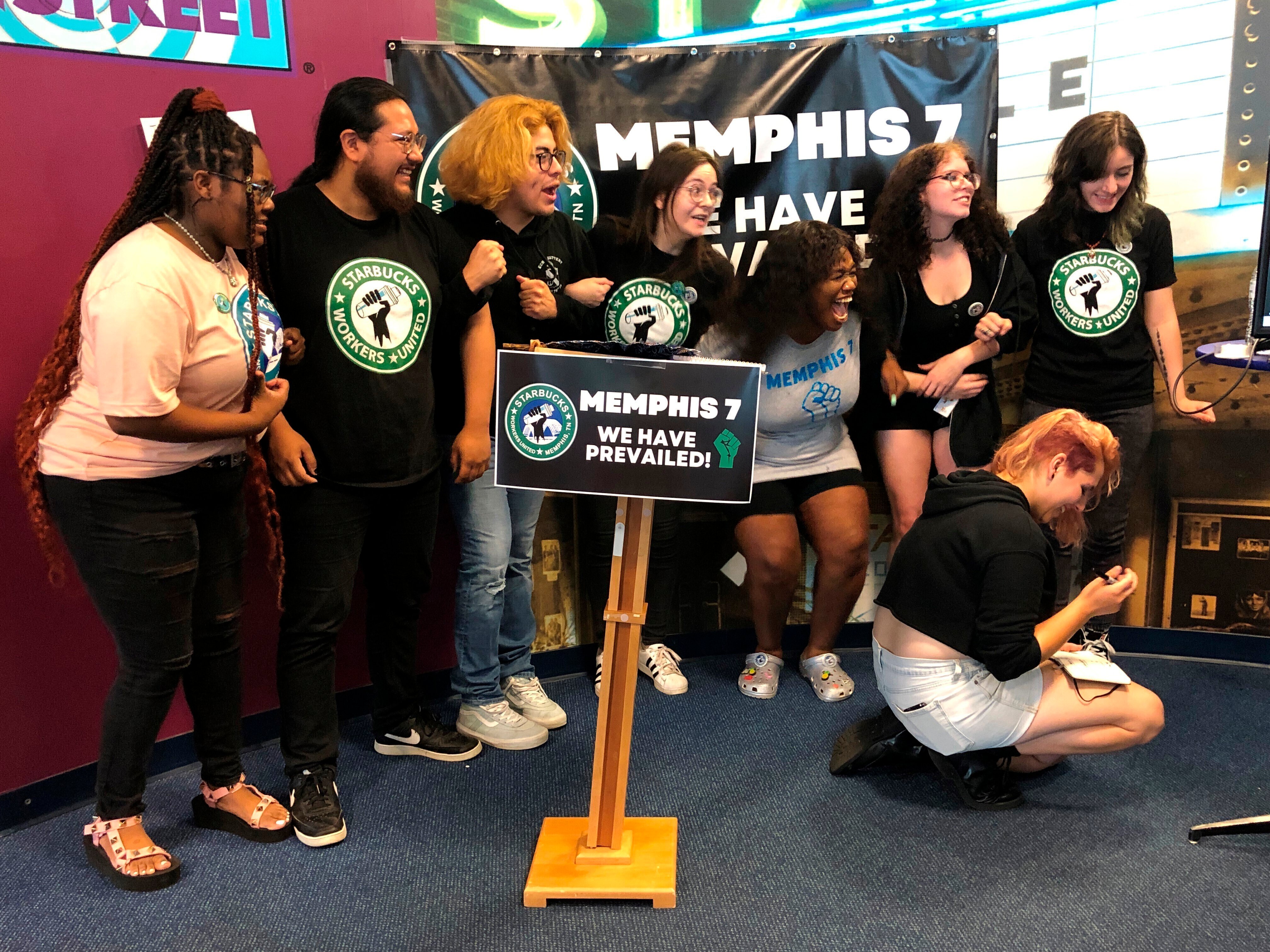Supreme Court likely to side with Starbucks, curtail labor board authority

A group of fired Starbucks employees celebrate the result of a vote to unionize one of the coffee company's locations on June 7, 2022, in Memphis, Tenn. (AP Photo/Adrian Sainz, File)
The Supreme Court appeared prepared to side with Starbucks in its request to curtail the National Labor Relations Board’s authority in determining whether fired union activists should get their jobs back in a case that was argued before the court Tuesday.
The justices heard Starbucks’s challenge to a federal district court’s 2022 decision to order Starbucks to reinstate a group of seven baristas who claimed Starbucks fired them from a Memphis coffeehouse in retaliation for union-organizing.
The Seattle-based coffee giant says its move to fire the Memphis workers was within the company’s rights under the law, because the workers violated company policy by inviting a TV news crew into the store after-hours. The National Labor Relations Board (NLRB) agreed with the workers’ claim that Starbucks had illegally fired them.
The justices appear poised to rule to make it tougher for the NLRB to obtain relief for labor activists. Advocates say such a move could have a chilling effect on union drives during a period of heightened union activism in the United States.
Federal circuit courts have the authority to grant NLRB requests to force companies to rehire union organizers, or require other actions like reopening closed stores or bargaining with unions.
At the Supreme Court on Tuesday, the majority of the justices across the ideological spectrum appeared to agree with Starbucks that the NLRB wielded too much power in determining the outcome of the Memphis case. That’s because some courts, including the one that gave the Memphis workers their jobs back, give more weight to the labor board’s findings during investigations than other courts that rely more on their own findings.
“In all sorts of alphabet soup agencies, we don’t do this,” Justice Neil M. Gorsuch said. “So why is this particular statutory regime different than so many others?”
Other justices, including Sonia Sotomayor and Elena Kagan, appeared to agree that a more uniform test is necessary for federal courts that are considering labor board requests for relief.
“I do understand why that needs to be corrected,” said Sotomayor, noting “it’s the court that has to decide the likelihood of merits” to allegations of illegal conduct.
Justice Ketanji Brown Jackson appeared more convinced by the NLRB’s argument that Congress gave it the authority to conduct investigations into alleged violations of workers’ labor rights and those findings should be prioritized by federal courts.
“We’re in the context of a statute in which Congress has given the board the ability to determine the merits and—at least in the first instance—the ability to make the investigation,” Jackson said.
The case arrives before the Supreme Court as Starbucks appears to have taken a new, more cordial tone, agreeing to talks with its union that could pave the way to the first labor contracts for stores that have already unionized. The company and the union resume bargaining this week, following a breakdown in talks months ago, with a goal of withdrawing ongoing litigation.
Starbucks’s attorney argued Tuesday that the federal courts should use a stricter standard when it comes to going over the company’s head to reinstate fired workers. The company has said the federal district court wrongly relied on “a minimal standard” in approving the request to reinstate the Memphis workers, rather than what it says is a tougher “four-factor” test used by courts in other regions of the country.
“What Starbucks wants is just a level playing field,” said Lisa Blatt of Williams & Connolly, representing Starbucks.
Justice Department lawyer Austin Raynor, who represented the NLRB, argued that the courts’ formula for granting relief has been adapted to labor law, as mandated by Congress.
He also noted that out of 20,000 unfair labor practice charges filed with the NLRB, the agency only filed seven requests asking for federal courts to grant relief last year, noting this was the “cream of the crop” of the cases it reviewed.
“This is an expert agency that has said we think these are the most deserving of relief,” Raynor said.
The Supreme Court in recent years has consistently ruled in favor of employers and corporate interests, including in a 2023 decision to make unions more liable for financial losses attributable to work stoppages.
President Biden’s appointed leader of the NLRB, Jennifer Abruzzo, has earned a reputation for taking an aggressive approach to defending workers’ organizing rights. In 2022, she urged the agency’s staff to request relief from courts in “earliest phases of unlawful employer anti-union actions.”
More than 400 of Starbucks’s 9,600 company-operated U.S. stores have voted to unionize with Starbucks Workers United since the campaign went public in 2021.
Union officials expressed disappointment that Starbucks has forged ahead with its Supreme Court case.
Lynne Fox, president of Workers United, Starbucks workers’ parent union, told The Washington Post that “the day [Starbucks] committed to a new path should’ve been the day that they pulled back the case before SCOTUS.”
And the NLRB is facing other, more drastic legal challenges to its authority. SpaceX filed a lawsuit in a federal court in Texas this year claiming that the agency’s structure is “unconstitutional” after the NLRB issued a complaint against the space rocket company, alleging it illegally fired eight employees for criticizing the company’s leader, Elon Musk.
Starbucks, Amazon and Trader Joe’s have since echoed SpaceX’s argument in legal proceedings.
Abruzzo, the NLRB chief, has slammed these corporate challenges. At a panel this month, she called the companies “deep-pocket, low-road employers” who are trying to divert the agency from its mission to defend workers’ rights “because they have the money to do so.”



